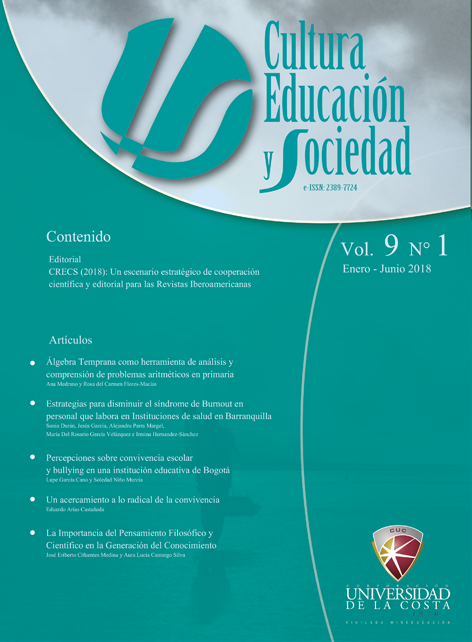Importance of philosophical and scientific thought in the generation of Knowledge
DOI:
https://doi.org/10.17981/cultedusoc.9.1.2018.05Keywords:
Philosophical thought; scientist; knowledge generationAbstract
The object of the dissertation is to conclude that the philosophical and scientific thought have con-tributed to the generation of knowledge throughout history and is consolidated in the twentieth century and now the incidence in the XXI. Philosophy is a mental activity through which we build the har-monic labyrinth of ideas, many of them charged with experiences and some aimed at practice. For Wittgenstein, philosophy is not a science but an activity, why philosophize word connotes a dynamic sense, deconstruction, re thinking construction. To Radnitzky, the role of philosophy is to build systems synopsis of knowledge produced by science; so philosophy is a metascience. Why philosophical thought leads to reflection and leads to the genera-tion of knowledge in every period of history and has been fortified in recent centuries, especially in the twentieth century, which has been addressed: The Philosophy of Science which, from different looks, epistemology has gained significant ground since its arguments. Forever and today, the philosophy has been asked and tried to give rational answers to questions such as: What? Why? Who? Why? And the key question of philosophy is the Why? essential concern and that makes it vital to philosophy at least Greek philosophy dedicated to the pursuit of the “principle” of things both at the level of reality and at the level of knowledge. So, if you have not seen in some admiration philosophy, it is neces-sary to attack, destroy perhaps to finally fall into oblivion.
Downloads
References
Azcárraga, J. A. (2002). Ciencia y Filosofía. Mètode, Anuario, (2002), 40-47.
Asensi-Artiga, V. y Parra-Pujante, A. (2002). El método científico y la nueva filosofía de la ciencia. Anales de documentación, 5(1), 9-19.
Bojaca, A. J. (2000). ZYX La lengua filosófica Universal. Colombia: Edición A&C Diseñadores Ltda.
Carman, C. (2007). La filosofía de la ciencia en el siglo XX. Recuperado de: https://ubc.edu.mx/plataformavirtual/mod/folder/view.php?id=1631.
Iranzo, V. (2005).Filosofía de la ciencia e historia de la ciencia. Quaderns de filosofia i ciència, 35, pp. 19-43. Universitat de València
Cifuentes-Medina, J. E. (2016). El método científico y la nueva filosofía de la ciencia: aportes y perspectivas. Rastros Rostros, 18(33), 61-70. Recuperado de http://dx.doi.org/10.16925/ra.v18i33.1681
Cifuentes, J. y Pedraza, J. (2016). Teorías no euclidianas y Filosofía de la Ciencia siglo XX: tendencias epistemológicas siglo XXI. Revista Criterios, 23(1), 211-229.
Gandía, C. E. (2004). Filosofía de la Ciencia. Recuperado de: https://ubc.edu.mx/plataformavirtual/mod/folder/view.php?id=1631
González, A.A. (1969). Historia de la Filosofía: En cuadros esquemáticos. 6ª ed. Madrid: Ediciones EPESA S. A.
Giraldo, J. (2014). ¿Cuál es el lugar del sujeto en la educación virtual?. Cultura, Educación y Sociedad, 5(1), 69-89. Recuperado de: http://revistascientificas.cuc.edu.co/index.php/culturaeducacionysociedad/article/view/996/pdf_213.
Kuhn, T. (1975). La Estructura de las Revoluciones Científicas. México, D.F.: FCE.
Lakatos, I. (1982). La historia de la ciencia y sus reconstrucciones racionales. 2ª ed. Madrid: Tecnos.
Ortiz, F. y García M. (2010) Metodología de la investigación: El proceso y sus técnicas. México, D.F.: Limusa
Padrón, J. (2007). Tendencias epistemológicas de la investigación científica en el siglo XXI. Cinta de Moebio, 28(1), 1-28. Recuperado de: http://www.moebio.uchile.cl/28/padron.html.
Senior, J. (2001). El surgimiento de las teorías no euclidianas y su influencia en la filosofía de la ciencia del siglo XX. Revista Colombiana de Filosofía de la Ciencia, 2(4), 45-63.
Rivadulla, A. (2004). La filosofía de la ciencia hoy: problemas y posiciones. Perspectivas del pensamiento contemporáneo / coord. Por Juan Manuel Navarro Cordón, Vol. 2, 2004, ISBN 84-9756-231-3, págs. 109-163Universidad Complutense de Madrid.
Suarez, M.G. (2003). Pienso… Filosofía y su Historia II. 1ª ed. Bogotá, D.C.: Editorial Voluntad.
Martínez, J. E. (2001). El surgimiento de las teorías no euclidianas y su influencia en la filosofía de la ciencia del siglo XX. Revista colombiana de filosofía de la ciencia, 2(5), 45-63.
Medina, J. E. C. y Suaréz, J. I. P. (2017). Teorías no euclidianas y Filosofía de la Ciencia siglo XX: tendencias epistemológicas siglo XXI. Revista Criterios, 23(1), 211-229.
Verano, G. L. (2004). Pienso… Filosofía y su Historia I. 1ª ed. Bogotá, D.C.: Editorial Voluntad.
Valdés, O. J. (2015). Filosofía de la Ciencia. (Documento de trabajo académico).
Downloads
Published
How to Cite
Issue
Section
License
Copyright (c) 2018 CULTURA EDUCACIÓN Y SOCIEDAD

This work is licensed under a Creative Commons Attribution-NonCommercial-NoDerivatives 4.0 International License.
![]()
Creative Commons 2020 CULTURA EDUCACIÓN Y SOCIEDAD
This article is under international license Creative Commons Reconocimiento-NoComercial-SinObrasDerivadas 4.0.
The published articles are the sole responsibility of their authors and do not necessarily reflect the opinions of the editorial committee.
CULTURA EDUCACIÓN Y SOCIEDAD respects the moral rights of its authors, who assign to the editorial committee the patrimonial rights of the published material. In turn, the authors inform that this work is unpublished and has not been previously published.
All articles are under a:
Licencia Creative Commons Atribución-NoComercial-SinDerivadas 4.0 Internacional.
![]()


 English
English
 Español (España)
Español (España)




_12.53_.27_p_. m_._3.png)





_12.57_.35_p_. m_._3.png)
_12.50_.37_p_. m_._3.png)



